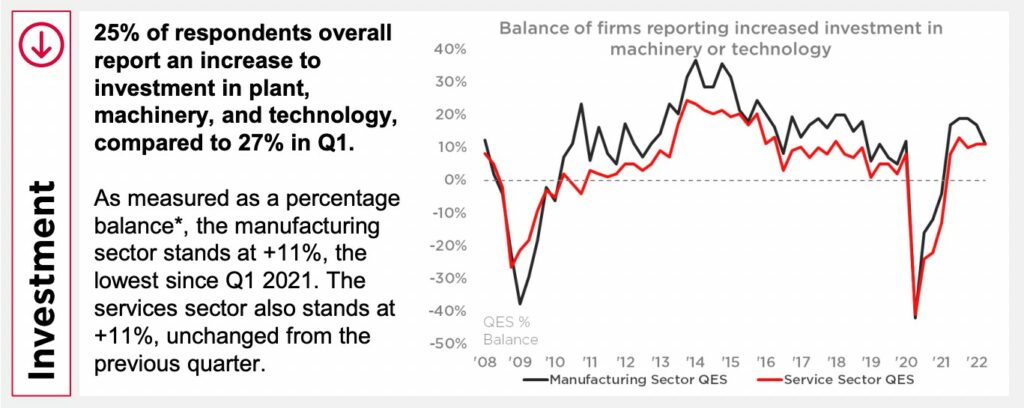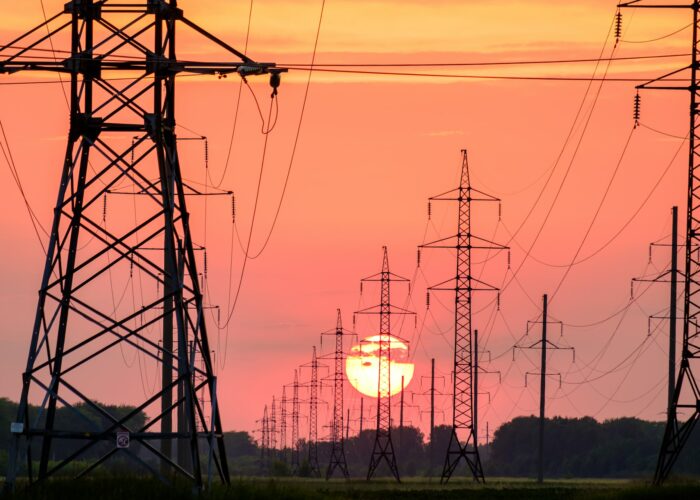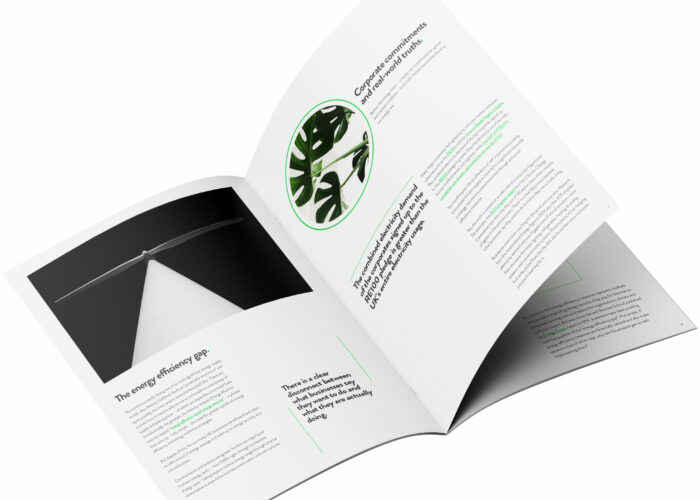The latest industry reports from two of the UK’s leading business organisations highlights how much pressure companies, particularly those in the manufacturing sector, are under. Everyday decision makers are faced with remaining competitive against a backdrop of rising energy prices whilst minimising their environmental impact as they seek to deliver on ambitious decarbonisation and net zero strategies.
The pressure is rising
According to the British Chamber of Commerce (BCC) Quarterly Economic Survey (QES) for Q2 2022, the pressures being placed on businesses has reached new heights, with manufacturing being cited as one of the sectors feeling the most strain.
The independent survey of business sentiment shows that long term business confidence has slipped back since Q1 with the decline, unsurprisingly, affecting plans to invest as we enter a period of heightened economic uncertainty. Indeed, 75% of decision makers say they have no plans to increase investment in plant, machinery or equipment – up two percent on the last quarter.
Despite this, the British Chambers of Commerce’s Director General Shevaun Haviland believes it is not too late for the Government to take action to help businesses through these challenging times, saying steps to relieve the tax burden on firms and encourage investment are crucial.

Optimistic investment intensions
The Confederation of British Industry (CBI) painted a similar picture when publishing its latest industrial trends survey.
Whilst optimism across the sector fell across the sector for the third consecutive quarter, investment intentions for the year ahead did show signs of improvement when compared to Q1. The organisation’s Chief Economist Anna Leach called for the new Prime Minister to announce a permanent success to the Super Deduction Tax adding: “Stronger investment will be vital if the UK is to reinvigorate growth and keep the recession at bay.”
Push for decarbonisation
With decarbonisation remaining a top priority for manufacturers, investment will also be needed if the industry is to continue leading the charge towards achieving net zero targets.
Whilst the latest Progress Report from the Climate Change Committee (CCC) made uncomfortable reading for the Government due to its ‘hire-wire approach’, a survey carried out by Make UK of senior decision-makers at UK-based manufacturers revealed there is an increased appetite for reducing emissions – 97% have the intention to reduce carbon emissions within 12 months.
Factors such as responding to soaring energy costs and the government’s net zero policies have provided them with the impetus to make positive changes to their operations. Indeed, a majority of respondents saw improving energy efficiency as the main focus decarbonisation.
Great strides are being made across the sector. Yet despite the enthusiasm, other organisations are lagging behind. And once again the financial burden of upgrading or replacing equipment was cited as a major barrier to change. Despite Chancellor Rishi Sunak saying earlier this year that he would offer support to the sector in the autumn, Make UK warned that help is needed before the summer parliamentary recess in order for businesses to “weather the immediate storm”, something that has become increasingly unlikely dur to events of the past few weeks.
Such is the challenge being faced, the Manufacturing Technology Centre (MTC) has urged the government to provide more funding to improve energy resilience and sustainability, warning that without it there is a strong risk net zero targets will be missed.
As a specialist energy solutions finance company, we understand that finance remains one of the biggest barriers to positive change, and many businesses will be put off taking the necessary steps that will improve their energy resilience and accelerate decarbonisation due to a lack of access to investment funds. But it is vital to remember that not every change has to be complex or costly.
With our deep domain knowledge, we’re here to help remove the barriers to energy finance. We do not have a one-size fits all approach as all energy resilience and carbon reduction schemes are different. By taking time to understand the key drivers for change, we can design packages based on the best solution for the customer – whether they are replacing outdated lighting schemes or implementing large-scale renewable solutions, EV infrastructures and distributed energy schemes.
In the face of mounting pressure, investment will be the key to delivering on decarbonisation and maintaining operational competitiveness.
Capitas Finance specialises in financing energy solutions for carbon-conscious businesses and public sector organisations. Our products and services are designed to help you implement sustainable, low carbon technologies and strategies that accelerate the path to decarbonisation, reduce energy bills and reduce reliance on the grid. To find out how Capitas can work with you, drop us a line here.
Other blogs you may be interested in.




